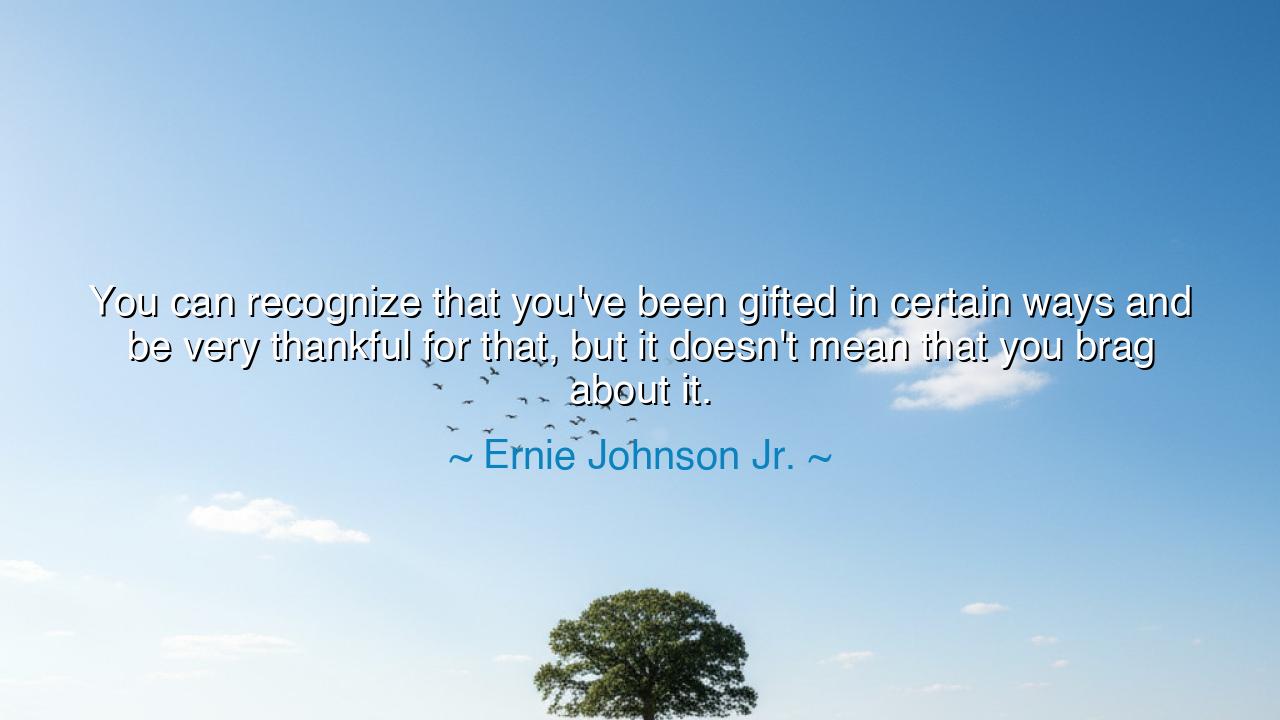
You can recognize that you've been gifted in certain ways and be
You can recognize that you've been gifted in certain ways and be very thankful for that, but it doesn't mean that you brag about it.






Ernie Johnson Jr. once declared with the wisdom of a seasoned soul: “You can recognize that you’ve been gifted in certain ways and be very thankful for that, but it doesn’t mean that you brag about it.” These words carry a deep resonance, for they speak of the eternal balance between acknowledgment and humility. To see one’s own gifts clearly is wisdom, but to exalt oneself above others for them is folly. The true nobility of character lies not in the loud proclamation of greatness, but in the quiet stewardship of gifts entrusted to us.
The ancients understood this balance well. The philosopher Socrates, though one of the wisest men of his age, claimed that he knew nothing, teaching that wisdom begins with humility. The Greeks warned against hubris—the arrogance of mortals who believed themselves equal to the gods. Such men often met destruction, not because their gifts were false, but because they wielded them with pride rather than gratitude. Johnson’s words are a modern echo of this timeless teaching: thankfulness is the shield of the gifted, guarding them from the ruin of vanity.
To be gifted is to carry both privilege and responsibility. A strong body, a quick mind, a voice that moves hearts—these are not earned at birth but given. Gratitude acknowledges that these treasures come from beyond the self, whether from God, nature, or ancestry. But once given, they must be cultivated and used rightly. The foolish boast of their gifts as though they are self-made; the wise labor silently, knowing that their role is not to flaunt but to serve.
History offers us clear examples. Consider George Washington, whose leadership and courage helped birth a nation. He was hailed as a hero, yet when offered kingship, he refused it, choosing instead to step away from power. He recognized his gifts, but he did not brag of them; rather, he was thankful for the chance to serve and humble enough to surrender glory for the good of his people. This humility preserved his honor far beyond the battlefield, setting an example for all leaders to follow.
Johnson’s words remind us also of the poison of arrogance. Many with great gifts have destroyed themselves by boasting, losing the respect of others and blinding themselves to their own faults. Talent without humility becomes corruption; power without gratitude becomes tyranny. But the one who remembers to be thankful, who uses their strengths quietly and faithfully, inspires not resentment but reverence. Humility amplifies the beauty of the gift, making it shine brighter because it is shared freely, not hoarded or exalted.
The deeper meaning is this: the purpose of a gift is not self-glorification but service. If you are strong, it is so you may protect. If you are wise, it is so you may guide. If you are eloquent, it is so you may speak truth. To brag about gifts is to turn them inward, but to be thankful is to turn them outward, toward others, transforming blessings into acts of love and inspiration.
The lesson is clear. Recognize your gifts without denying them, for false humility is no virtue. But carry them with reverence, with quiet thankfulness, and with a determination to use them for good. When praise comes, do not let it make you proud, but let it remind you of the responsibility entrusted to you.
Practical counsel may be drawn. Each day, reflect on the strengths you have, however small, and give thanks for them. Seek to use them to bless others rather than magnify yourself. And when tempted to boast, remember the wisdom of the ancients and the quiet humility of Johnson’s words: greatness is not found in the noise of self-praise, but in the silent, steadfast offering of one’s gifts to the world.






AAdministratorAdministrator
Welcome, honored guests. Please leave a comment, we will respond soon